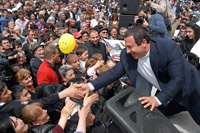Indeed, the statement of the PAP was a big surprise. They stated that “the party doesn’t find it expedient to join the ruling coalition.” This was a real victory for the people, who gave their votes to the PAP. But our reality works in a way that doesn’t give any value to the votes and opinions of people, who trust this or that party. The parties don’t feel obligated for their decisions to suffice the demands of the people. But the surprise of the statement of the PAP is that the votes given to the PAP have been known hours after the May 6 elections. During the previous parliamentary elections the voters have given their votes to the PAP and have trusted that the party would improve their social-economic conditions. Back then as well, the PAP didn’t have the “constitutional right to form a government and implement its plans as a result of the election outcome.” But the PAP joined the ruling coalition with the Legal State Party, which wasn’t acceptable for the RPA. During these elections the PAP gained more than twice of the previous votes. And had the right to have a more weighty representation in the coalition, which would have helped the party to resolve the social-economic issues of the country as envisioned by the party. But it refused to become a part of the coalition. Besides, the party stated that it wasn’t going to join the coalition 18 days after the elections. If the party was so determined about not joining the coalition and didn’t approve of the election outcomes it should have made this statement right after the May 6 elections. If the PAP had to really follow its principles and didn’t care much about the ministerial portfolios and the failed negotiation it should have made this statement long ago. Indeed, the effects of this political step were unprecedented. There are also opinions that by not joining the coalition it might be possible to destroy the political monopoly. However, the text of the statement of the PAP actually creates more questions than answers. The PAP doesn’t wish to join a coalition with a party, which has received its votes though well-known methods. The RPA has done this in order not to have the necessity of any political ally for its majority in the parliament. Does the PAP have doubts about the results of elections? If it doesn’t have doubts then it’s a real problem and if it does but doesn’t bring those up then this is a well-planned policy. In that case, it is not honest to point out the thousands of voters that trusted the party and as though the latter doesn’t join the coalition in order to be morally accountable for the votes and trust of the people. The withdrawal of Hmayak Hovhannisyan, who was number nine on the PAP list comes to prove that the PAP doesn’t apply very democratic methods and doesn’t practice internal democracy. Let’s be honest and agree that Mr. Hovhannisyan overestimates the number of PAP votes with its political activity. Hmayak Hovhannisyan, however, clearly makes everyone understand that he hadn’t resigned from the list voluntarily. “The calculations done after the elections show that the ones that brought votes are not prominent politicians but the ones, who gave away money to buy votes.” It is merely said that the PAP as well gave away money with bags. So it remains unclear whether the PAP refused to join the coalition or the RPA didn’t offer the PAP to do so. An RPA MP Ruben Hayrapetyan on May 8 told the reporters of Aravot the following in regard of the RPA-PAP coalition, “It is not quite desirable but I don’t know. It’s not clear yet. We don’t need it. The RPA doesn’t need a coalition. If they really ask we might allow them join the coalition. If they really beg us we will think about that. But I’m not sure that the RPA will end up accept the PAP or not.” Vardan Oskanyan has given a more rigid response in regard of the formation of the coalition by naming it artificial. The political wing of the RPA has been more delicate and cautious in its opinions. In particular, when asked by a journalist whether this behavior of the PAP was expected, the member of the executive body of the RPA Hovik Abrahamyan gave a positive answer. He also clearly said that the RPA has never persuaded the PAP to join the coalition because the RPA doesn’t need it very much. Hovik Abrahamyan also mentioned, “They (PAP-L.A.) are not opposition. In their statement they mentioned that they were going to be strictly constructive. And if they keep their word we might collaborate with them.” If… the PAP statement didn’t even refer to who they were going to nominate or endorse during the 2013 elections of the president. And the formation of the coalition first of all anticipates a response to this question. Therefore, the later edits of the text of the statement won’t affect the full logic of the statement.

